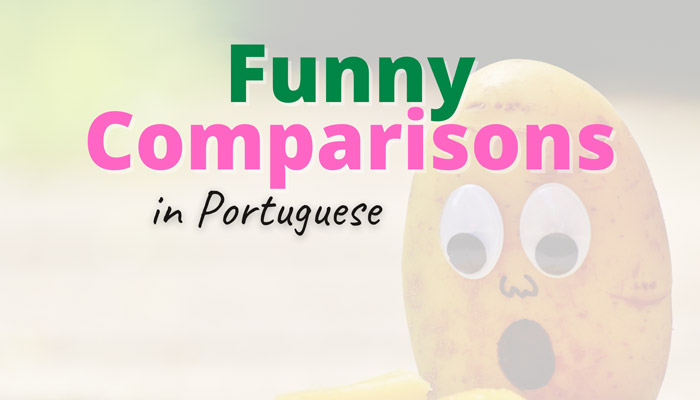Who would have thought that people of the same planet, having the same needs and surrounded by the same things, could perceive the world around them in such a different way and express themselves. Yes, habits, traditions, languages, philosophies may differ, but in simple things we could be more similar to each other!
Today’s article will tell you what associations come to the mind of the Portuguese, how they can complement or criticize. To do this, they compare the appearance or qualities of a person with objects: vegetables and fruits, animals or other inanimate objects.
Positive comparisons with animals
Man is considered the most developed creature on the planet. However, animals have qualities that everyone can envy. From here appeared quite logical comparisons.
We know that, for example, a dog is man’s best friend. It always follows her owner (which cannot be said about cats), it differs in its loyalty to humans from other animals. “Fiel como um cão” (faithful as a dog) – say the Portuguese. And in this they are right!
A close relative of dogs is the fox. Judging by cartoons and children’s fairy tales, the fox is usually a negative character – cunning and predatory. And the Portuguese think the opposite, they believe that the fox is a very positive animal: “Esperto como uma raposa” (smart as a fox).
Another comparison of a person with an animal, namely, his physical condition, is “Forte como um touro” (strong as a bull). This information refers only to muscle size, and does not characterize health.
Critical comparison with animals
In many languages, people are called donkeys only if they want to offend them. These animals are considered slow, wayward, uncontrollable. In general, the Portuguese distinguish another negative, but important quality in this animal: “Teimoso como um burro” (stubborn as a donkey).
A comparison that is no less surprising is “vaidoso como um pavão” (vain as a peacock). During the mating season, the peacock shows a beautiful tail to the female, walking in front of her in all its glory. In the world of animals, this is a tradition, and in the world of people, a parallel is drawn with the desire to look good in front of others, to receive confirmation of one’s superiority, namely, with vanity.
In order to celebrate the slowness of a person, the Portuguese do not have many options. The slowest creature is perhaps the snail. However, the Portuguese chose another insect, the slug: “Lento como uma lesma” (slow like a slug).
It is difficult to imagine the relationship between animals more tense than that of a cat and a dog. Of course, there are exceptions, especially at home. But in nature, dogs love to attack cats. The Portuguese also agree with this and therefore characterize complex relationships between people as follows: “São como são e gato” (like a cat with a dog).
Another expression that once again affects the dog is: “Esfomeado como um cão” (hungry like a dog). Despite the fact that now there are very small breeds of dogs that eat little, the Portuguese still remember the fact that dogs are hungry all the time. Probably due to severe hunger!
Comparison with vegetables and fruits
If you hear the expression “Corado como um tomate” (red like a tomato), then you will immediately guess what it is about. Under what circumstances can such a comparison be heard? With different: blushed with anger, shame, excitement or tension. Everything fits!
What edible plant could describe a person’s appearance as new, pleasant, healthy? Surely one that quickly deteriorates, so its freshness is the main indicator. “Fresco como uma alface” (as fresh as lettuce) is a great compliment to your looks, because there is no better comparison!
Comparison with inanimate objects
If a person is compared with a thing, then they want to criticize him. For example, “Surdo como uma porta” (deaf as a door) means that the person does not understand you, as if you were asking the door to open or close on its own. The effect would be exactly the same!
Now imagine a clay pot. Usually these are dishes with a wide neck and sides. From here came the association of a pot with a fat person: “Gordo como um pote” (thick as a pot). It doesn’t sound offensive at all when it’s not about the mass and amount of fat, but just about the shape.
But another comparison speaks of the mass, however, it is not offensive. It really states the fact that a person or even an object is very heavy: “Pesado como chumbo” (heavy as lead). In fact, lead is not the heaviest metal, but for some reason it was chosen for comparison. The opposite comparison can be made if you choose a very thin thing, for example, a sword: “Magro como um espeto” (thin as a sword).
Well, the last expression also does not offend anyone. It can only describe a sickly, weak or frightened state of a person: “Branco como a cal” (white as lime).
A comparison that cannot be attributed to good or bad is the following: “Calado como um túmulo” (silent as a grave). In different situations, this quality can be both good and bad. For example, for a captured spy, this is very valuable. Or for a friend who definitely won’t spill your secrets!
Conclusion
Although this is not the most important information about the Portuguese language, we want to reveal all the details for you. Such comparisons are very easy to remember and use, especially when they are addressed to you. Take your time to be offended if you are compared to lettuce or a dog. Please re-read this article with attention!
